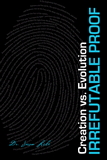Bias and Faith
Originally published in Creation 15, no 4 (September 1993): 50-51.
The clash between creation science and evolution science is thus not a clash between science and religion at all, but between two competing world views.
Q:
‘Creation scientists start with a belief in the Bible as truth. Doesn’t this make them biased compared to other scientists, and how can they be doing science (a search for the truth) when they claim to already have the truth?’
A:
This is a common accusation, but it misses the point in several areas. First, the Bible has never claimed (nor do we claim) that it gives exhaustive truth, merely that what it does teach is the truth. There is a vast amount of room for real science within the boundaries of a biblical framework. Many varying hypotheses can be constructed and tested. It is readily admitted, however, that the truth of the framework itself, in the broadest sense, is not negotiable.1
The Bible clearly teaches that there was a global Flood, for instance. This sets boundaries on the types of models worth pursuing when discussing human and world history. Does this mean no intellectual or academic freedom? Not at all. Researchers are free to conclude that the evidence indicates that there was no such Flood, but having done so, they would no longer be involved in creation science. They would have changed their presupposition, their starting set of assumptions.
However, those who made such a shift would not have gone from a ‘biased’ position to an ‘unbiased’ one. They merely would have changed their bias—shifted their belief system from one which accepts the Bible as the Word of God to one which does not.
There really is no such thing as ‘neutral’ origins science. Because the Bible clearly states that there was a world Flood, then any position which even assumes ‘well, let’s leave open the possibility that there wasn’t’ is inherently biased against the Bible’s claim to be the very Word of God, who cannot lie.
Facts don’t speak
In any case, it has long been recognized that evidence does not speak for itself. Facts are not understood in isolation: they are fitted into belief systems. A person who shifts from evolution science to creation science (or vice versa) may in each case continue to do valid science—it is only the underlying belief system which has shifted.
It has been pointed out that there is a rigid set of metaphysical rules in evolution science too. Any hint of miraculous original creation is ruled out of court by definition (see ‘Science: The Rules of the Game’, Creation magazine, Vol. 11 No. 1, pp. 47–50). The belief that the origin of all things must have been by means of the processes and properties now operating (i.e. that the world could make itself) is insisted upon as unshakeable dogma. Whether or not creation can be shown to better fit the facts of the present is not even regarded as a legitimate question.
Evolutionists and creationists both therefore undertake research in faith that it will solve outstanding questions about the ‘how’ of their non-negotiable belief, and in the hope that such research will further strengthen this belief. When evolutionary biologists argue among themselves about the mechanisms of evolution, their faith-belief is that these transformations have really occurred, their efforts being merely to find out how, not whether.
Faith vs faith
In other words, bias and faith are involved on both sides. Neither position is capable of ultimate proof anyway. You can’t demand that God repeat His six-day creation so as to satisfy your scientific curiosity, but this does not make it untrue.
Exactly the same is true of mega-evolution. No one can fairly demand of an evolutionist that he prove his position by making a reptile turn into a bird right now (even this would not strictly prove it happened in the past, although it would certainly enhance the credibility of the case). Both positions are in that sense outside the realm of experimental science as commonly understood.
The clash between creation science and evolution science is thus not a clash between science and religion at all, but between two competing world views, both of which have access to the methodology and tools of science, and both of which involve elements of faith and bias.
Footnotes
- This is not to be taken to mean that there is no latitude anywhere in understanding the biblical text. For instance, whether or not the 40 days of rain at the time of the Flood were due to the collapse of a pre-Flood vapour canopy is open for discussion on textual and scientific grounds, and does not form part of the ‘non-negotiable framework’ of creation science itself.
- It is common to confuse the word ‘scientific’ with ‘true’. A statement can be scientific, but untrue. For instance, ‘Water boils at sea level at 80 degrees C’ is a scientific statement, because it is in principle testable by repeatable observation. It is, however, untrue. The statement, ‘The solar system formed from a swirling cloud of dust and gas 4.5 billion years ago’, is not testable in the same way, and so is outside of experimental science. So is the statement, ‘God created all things supernaturally in six days.’ Both are in that sense unscientific statements, but that does not of itself make them untrue.
Recommended Resources

Answers in Genesis is an apologetics ministry, dedicated to helping Christians defend their faith and proclaim the good news of Jesus Christ.
- Customer Service 800.778.3390
- © 2024 Answers in Genesis




